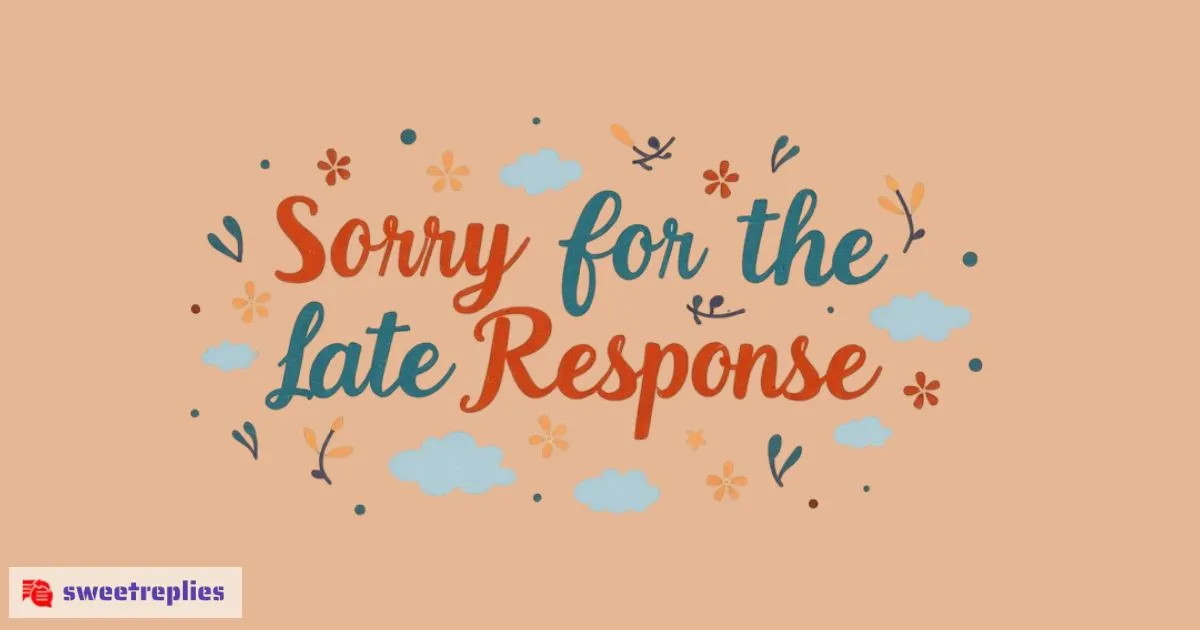We’ve all been there sitting at our desks, overwhelmed by the chaos of a busy work week, only to realize we’ve missed a call or overlooked an important email. When it’s a packed schedule, unexpected distractions, or just life getting in the way, delayed replies are sometimes unavoidable.
And then comes that moment of hesitation when you have to write, “Sorry for the late response.” It’s a phrase we’ve all used, but is it enough? Does it sound genuine, or is it starting to feel like a worn-out excuse in today’s world of instant communication?
I get it it’s challenging to juggle priorities while still maintaining professional communication. In this post, I’ll share how to respond thoughtfully when you’re behind on messages, including respectful alternatives to “Sorry for the late response” and tips to improve your email etiquette without sounding impersonal.
Let’s face it, life happens when it’s a missed call, an unread message, or a delay out of your control. Let’s navigate it together and communicate better moving forward.
Professional Replies to ‘Sorry for the late Response’

We’ve all experienced the frustration of a delayed reply, when it’s from a coworker, client, or even a boss. A simple Sorry for the late response is often followed by uncertainty about how to keep things professional.
The key is to respond with respect and sincerity, ensuring the communication stays clear and productive. In this article, we’ll explore a variety of professional replies that can help you navigate these situations and maintain strong working relationships despite the delays.
1. Business Email Exchange
- Acknowledge the delay politely: Thank you for your patience during my delay in response.
- Take accountability: Apologies for the late reply. I’ve been managing some urgent priorities.
- Show appreciation for their patience: I truly appreciate your understanding and patience with this delay.
- Explain briefly: I had a particularly hectic week, but I’m now catching up on all messages.
- Provide a clear response: Here are the details you requested, and I apologize for the delay.
- Assure a timely response moving forward: Going forward, I’ll make sure to respond more promptly.
- Offer a solution if necessary: Please let me know if there’s anything urgent I can assist with.
- Keep it professional: I value our communication and am committed to timely responses.
- Express sincerity: I apologize for any inconvenience caused by my delay in replying.
- Provide context if needed: I’ve been dealing with an unexpectedly busy work week, but I’m now fully available.
- Use a positive tone: Thanks for your patience, and I look forward to resolving this promptly.
- End with appreciation: Once again, I apologize for the delay, and thank you for your understanding.
Also Read: Formal Replies to ‘Hope You’re Doing Well’
2. Client Interaction
- Acknowledge the delay with empathy: I appreciate your patience while I caught up on my responses.
- Clarify the cause of delay: Due to a few urgent matters, I wasn’t able to get back to you sooner.
- Apologize sincerely: I apologize for the delay, and I understand the importance of your request.
- Reaffirm commitment to service: Your needs are important to me, and I’ll ensure this won’t happen again.
- Provide a helpful update: I’ve reviewed your request, and here’s what I’ve come up with.
- Offer assistance moving forward: Please let me know if there’s anything else I can assist you with.
- Be specific with timelines: I will prioritize your request and ensure we move forward promptly.
- Express gratitude for their understanding: Thank you for your patience, and I appreciate your continued trust.
- Set clear expectations: I will send you the final details by the end of today.
- Ensure it doesn’t affect the relationship: I value our partnership and will ensure more timely responses moving forward.
- Apologize if it caused any inconvenience: I hope my delay didn’t cause too much inconvenience.
- Close professionally: Looking forward to resolving this quickly and efficiently for you.
3. Team Collaboration
- Acknowledge the delay: Thanks for your patience while I got caught up with other tasks.
- Explain the reason for the delay: I’ve been dealing with some urgent priorities that delayed my response.
- Apologize to the team: I’m sorry for any delays this may have caused in our workflow.
- Provide the requested information: Here’s the information you requested, and I appreciate your understanding.
- Assure it won’t happen again: I’ll ensure this doesn’t become a regular occurrence.
- Offer to make up for lost time: Let me know if there’s anything I can do to help move things along.
- Reaffirm collaboration: I’m committed to keeping things running smoothly for the team.
- Show commitment to future communication: I will be more responsive moving forward.
- Apologize if it caused confusion: Sorry if my delay caused any confusion; I’ll clarify everything now.
- Appreciate their flexibility: Thanks for your flexibility in working around this delay.
- Give an actionable update: I’m up to speed now and can assist with any remaining tasks.
- Reaffirm teamwork: We’ll keep pushing forward and ensure the project stays on track.
4. Customer Service Interaction
- Apologize for the delay: I’m sorry for the delay in responding, and I appreciate your patience.
- Acknowledge the customer’s concern: I understand your frustration with the delayed response.
- Provide context for the delay: We’ve been handling a high volume of requests, but I’m here now to assist you.
- Offer immediate assistance: I’ll get to the bottom of this right away and make sure it’s resolved.
- Express gratitude for their patience: Thank you for waiting; I’m happy to help now.
- Show empathy for their situation: I realize this delay may have caused inconvenience, and I apologize.
- Provide a solution: Here’s what I can do to resolve the issue you’ve raised.
- Offer a follow-up: I’ll follow up with you shortly to ensure everything is addressed.
- Apologize for any confusion: I’m sorry if my delay caused any confusion; I’ll clear that up now.
- Assure them this won’t be a regular issue: We’re streamlining our process to ensure quicker responses moving forward.
- Ask if further assistance is needed: Is there anything else I can assist you with while we’re at it?
- Close with professionalism: Thank you again for your patience. We appreciate your business.
Also Read: Perfect Replies To A Birthday Invitation Card
5. Networking or Professional Outreach
- Acknowledge the delay: Sorry for the delayed response; things have been a bit hectic on my end.
- Apologize briefly: I apologize for not getting back to you sooner; I’ve been juggling multiple tasks.
- Provide the information they need: Here’s the information you requested, and I look forward to connecting further.
- Show appreciation for their patience: Thank you for your understanding and patience during this busy time.
- Offer to connect soon: Let’s find a time to connect and would love to discuss potential opportunities.
- Reaffirm interest in the conversation: I’m still very interested in collaborating and would love to chat soon.
- Set up a future meeting: How about we set up a call next week to discuss things further?
- Be clear and concise: I appreciate you reaching out and apologizing for the delay.
- Apologize for missing the chance to connect: Sorry for missing your initial message let’s reconnect.
- Show continued interest in networking: I’d love to hear more about your projects when you have time.
- Set expectations for future communication: I’ll make sure to be more responsive moving forward.
- Close warmley: Looking forward to hearing from you soon!
6. Conflict Resolution
- Acknowledge the delay in response: Sorry for the delay in getting back to you regarding the issue.
- Show understanding: I understand this situation may have caused frustration, and I apologize.
- Offer an explanation: I’ve been managing some urgent priorities, but I’m ready to resolve this now.
- Express sincerity: I genuinely regret the delay and any inconvenience it may have caused.
- Provide a clear solution: Here’s what I propose to resolve the issue swiftly.
- Offer reassurance: I’m committed to resolving this in a way that works for both of us.
- Seek mutual understanding: Let’s work together to find a fair resolution.
- Apologize for any misunderstanding: If my delay caused any confusion, I’m here to clarify.
- Propose next steps: Here’s what we can do moving forward to address this.
- Take responsibility: I recognize my delay may have added to the issue, and I apologize.
- Ensure clarity moving forward: I’ll make sure we stay on top of things from here on out.
- Close with commitment: Let’s resolve this quickly and effectively.
7. Project Management Communication
- Acknowledge the delay: I’m sorry for the delay in providing this update.
- Offer context: We’ve had a few delays in our workflow, but I’m catching up now.
- Provide a status update: Here’s where we stand, and I appreciate your patience.
- Reaffirm commitment to deadlines: We’re working hard to ensure the project stays on track.
- Show understanding of their concerns: I understand the impact of this delay and I’m addressing it.
- Offer a revised timeline: Here’s the updated schedule, and I’ll keep you posted on progress.
- Ensure communication is clear: Let me know if you need any further clarification on the next steps.
- Take responsibility for the delay: I apologize for the delay, and I’m taking steps to prevent it from happening again.
- Provide a solution: Here’s what we can do to get back on track.
- Be proactive in addressing concerns: I’m working on resolving any outstanding issues right now.
- Assure timely responses going forward: I’ll make sure I’m more responsive moving forward.
- Reaffirm dedication to the project’s success: I’m committed to ensuring the success of this project despite the delay.
8. Performance Review Conversations
- Acknowledge the delay: I’m sorry for the delay in responding to your performance feedback.
- Express appreciation for their input: Thank you for your patience as I took the time to reflect on your feedback.
- Show willingness to improve: I understand the importance of timely responses and I’m working on improving this.
- Ask for clarification if needed: If there’s any further feedback you’d like to discuss, I’m open to it.
- Take responsibility: I realize that I’ve missed some opportunities, and I apologize.
- Reaffirm commitment to development: I’m eager to apply your feedback and improve moving forward.
- Provide an action plan: Here’s how I plan to address the areas of improvement discussed.
- Be proactive in requesting feedback: Please feel free to share any additional feedback or suggestions.
- Express gratitude for the opportunity to grow: I appreciate your constructive criticism and the chance to develop.
- Be sincere in your response: I’m truly sorry for the delay in responding and am committed to making the necessary changes.
- End with commitment to progress: I’m looking forward to demonstrating my growth in the coming months.
- Ensure open communication: I’ll make sure to stay on top of things and respond more promptly in the future.
Also Read: Simple & Sweet Farewell Cake Messages for Coworkers
Action-Oriented Replies to Just Move Forward

When someone suggests just moving forward, it’s important to acknowledge the message while maintaining focus on the next steps. A great way to respond is by saying, Understood, let’s focus on what’s ahead and keep pushing forward.
I’ll tackle the next task with urgency and ensure we make progress. This shows you’re on board with moving forward and ready to take action. It’s all about staying productive and making sure the momentum doesn’t stop.
- Got it! Let’s keep the momentum going and tackle the next step.
- Absolutely, I’ll shift gears and move forward with this now.
- Understood! Moving ahead with the next task right away.
- Great idea, let’s focus on what’s next and keep things moving.
- I’m on it! Let’s push forward and make progress.
- Moving forward as we speak! I’ll prioritize the next step.
- Got it, I’ll take action and make sure we stay on track.
- Alright, moving on! Let’s make sure we don’t lose momentum.
- I’ll handle the next task and ensure we’re making progress.
- No time to waste, let’s move ahead and keep things rolling.
- Understood, I’ll take it from here and move us forward.
- Let’s keep the focus sharp onward to the next goal!
- I’m ready! Moving ahead and pushing forward now.
- I’ve got it covered. Let’s move forward and stay productive.
- Let’s go! I’ll move us forward and tackle the next challenge.
- Sounds good, moving forward with the next steps now.
- Sure thing! I’ll keep things moving forward and ensure progress.
- Let’s get it done! Onward to the next phase with full focus.
- Time to take action moving forward and staying proactive.
- All right, shifting priorities to keep moving forward and getting things done.
Things to Say Instead of ‘Sorry for the Late Response’

Instead of simply saying Sorry for the late response, try offering a more thoughtful approach. You can acknowledge the delay with appreciation, like, I’ve been a bit behind on my messages, but I’m catching up now.
Thanks for your patience! This shows both respect for their time and that you’re actively working to engage. It adds a more professional and considerate touch to your communication.
- Thanks for your patience while I caught up on my messages.
- I appreciate your understanding as I’ve been a bit behind on my emails.
- I’ve been tied up, but I’m glad we can continue this conversation.
- Apologies for the delay; I’m catching up on things now.
- Thanks for waiting! Here’s the information you needed.
- I’ve been managing a few priorities, but I’m now available to respond.
- I appreciate your patience during this busy time.
- Thanks for bearing with me while I was caught up with other tasks.
- I’m glad to finally get back to you after some busy days!
- I apologize for the delay in getting back to you, but I’m on it now.
- Thank you for your understanding; I’m now able to address your inquiry.
- I’ve had a packed schedule, but I’m here to assist you now!
- I’m sorry for the lapse in response time, but I’m ready to jump in now.
- It took me a bit longer than expected to reply, but I’m happy to connect now.
- I appreciate your patience as I get back into the swing of things!
Also Read: How To Respond to A Declined Invitation
Final Words
Effective communication is all about being thoughtful and professional, even when dealing with delayed responses. Instead of simply apologizing for a late reply, try acknowledging the situation with empathy and offering context. This not only helps maintain positive relationships but also shows respect for the other person’s time.
By using alternative phrases, you can ensure that your responses are courteous, professional, and well-received, fostering better communication in both personal and work settings.
Key Insight
- Why is it important to avoid saying “Sorry for the late response”? Saying sorry too often can come across as repetitive or insincere. It’s better to acknowledge the situation thoughtfully and professionally, which can help maintain a positive tone.
- What are some good alternatives when I don’t want to apologize for a delayed response? You can express appreciation for the other person’s patience, such as “Thank you for waiting” or “I appreciate your understanding.” These alternatives sound more positive and forward-thinking.
- Can I use these alternatives in a professional setting? Yes, these alternatives are perfect for both personal and professional communication. They maintain a respectful tone and demonstrate that you’re actively engaged.
- How do I handle a response to a missed email or message without sounding defensive? Acknowledge the delay calmly with phrases like “I’ve been catching up on my messages, and I’m glad we’re connecting now.” This focuses on the present moment rather than lingering on past delays.
- What if I was delayed because of an emergency or urgent matter? If appropriate, briefly mention the reason, such as “I was caught up with an urgent issue, but I’m here to respond now.” This provides context and shows you’re committed to the conversation moving forward.

I’m Liam Quill, the writer behind SweetReplies.com, where words come with meaning, heart, and a little charm. I specialize in crafting the perfect replies whether it’s a sweet thank-you message, a thoughtful wish, or a clever response that leaves an impression. With every line I write, my goal is simple: to help you express yourself in a way that feels just right. Because the right words? They make all the difference.




